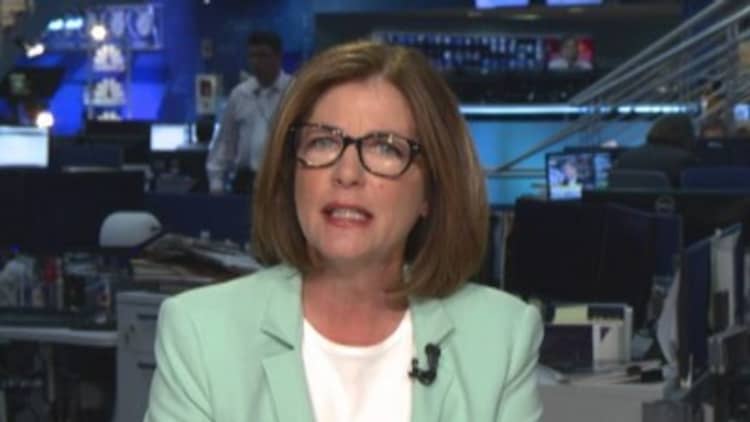
Worries that tensions between Russia and Ukraine could escalate into a military conflict sent stocks spiraling lower and could continue to hang over the market.
Stock futures turned lower Wednesday after reports of weak German factory orders and a surprise 0.3 contraction in Italian GDP shifted focus back to the sluggish European economy. The markets had been jittery early Tuesday on reports that . But an afternoon news wire headline quoting the Polish foreign minister drove stocks even lower, as traders focused on his warning that Russia is poised to invade and pressure Ukraine.
"Ironically, here we are on the anniversary of the First World War, and the focus on how these things start is very much on peoples' minds," said David Ader, chief Treasury strategist at CRT Capital.
Read MoreRussian gang holds 1.2B stolen Internet logins
Ader said the buying picked up in Treasurys Tuesday after the Bloomberg headline crossed, as the comments from Polish foreign minister Radoslaw Sikorski gave urgency to the earlier reports. Ader said some of the buying was driven by investors leaving risk asset, like high-yield corporates.
"Is it just pressure on Ukraine or is it an invasion of the Ukraine? Is it deeper sanctions that have repercussions for Russia and the entire world?" Ader asked. Traders said events currently simmering in the Middle East and the Russian-Ukraine conflict, which have pitted the U.S. and Europe against Russia, have the most power to unhinge markets.
Georgetown professor Angela Stent said that while Russian President Vladimir Putin was not expected to move troops into Ukraine, he would if he felt it was politically expedient.
Sikorski said Poland hoped the European union would act to build up NATO's eastern flank.
"He may be trying to rally the West. NATO is not going to send troops to Ukraine," said Stent, author of the book, "The Limits of Partnership" on U.S. Russian relations. "We could send military assistance, but we're not going to fight the Russians."
Fighting has centered around the Ukraine cities of Donetsk and Luhansk, both held by pro-Russian rebels.
Stent said Putin is no longer listening to economic liberals who believe the Russian economy should be integrated into the global economy. She said the Russian leader seems to be listening to a group that doesn't care if Russia becomes isolated and an enemy of the West.
Meanwhile, companies such as Exxon Mobil, who have business deals in Russia, are making their concerns known to the White House.
"The U.S. business community, while it understands the need for these sanctions, is hoping not to cut off all these deals," she said. "Economically, it has hurt Russia already. Firms thinking about making investment decisions are not making them because of the uncertainty." The banking restrictions are also pinching Moscow, and earlier Tuesday Russia pulled its third ruble bond offering in a row, citing unfavorable conditions as interest rates spike.
Read MoreBuying opportunity in 'punished' Russian stocks: Pro
European companies from Adidas to Lufthansa have already complained about the impact of Russia sanctions on their business, and on Tuesday Tass reported that Putin had instructed the government to consider retaliating against Western sanctions.
The heightened concern about Russia's intentions also come at a time when the stock market is particularly vulnerable to a shakeout after last week's sell-off. "We thought the initial decline last week was the first bang, and then we'd see a slightly lower low. This could be a washout move," said Andrew Burkly, institutional equities strategist at Oppenheimer Asset Management.
Read MoreSwiss try to prevent by passing of Russia sanctions
Traders say the S&P 500 fell through a key technical level around 1,925 that puts it on a path toward 1,900. The S&P closed at 1920, nearly a 1 percent decline. Stocks were also pressured by good economic data on the services sector Tuesday morning, reviving talk the Fed could move sooner to raise rates.
But the markets have also been highly sensitive to concerns about potential deflation in the euro zone and a sluggish economy. Germany is most tied to Russia, with companies large and small doing business in Moscow.
Traders have been closely monitoring the German stock market as an indicator for market risk, and it is well off its highs. The DAX was down 1.5 percent Wednesday.
"This isn't enough to get me to make any tactical moves," said Private Bank CIO Jack Ablin, of the sell off. "I may try to reassess our strategic position just to make sure we've got the right balances in place. It would equate it to trimming the sails as opposed to changing a tack. I don't see anything yet that would make me change course."
Ablin said, however, he's been very concerned about Europe and if things get worse there, that could change his view.
Read MoreNew sanctionsfor Russia—here's where they'll hurt
"The European Central Bank is behind the eight ball in relaxing monetary policy, and their struggling recovery is now going to be buffeted by sanctions. If I were to look at anything that would have me change my strategy, it's throwing in the towel on Draghi, " he said.
ECB President Mario Draghi holds a presser Thursday after the ECB rate meeting, and while there is no action expected at that meeting, Draghi's comments could still bring on volatility. The ECB is expected to take easing actions later in the year.
On Wednesday, traders will be watching EIA oil and gas inventory data at 10:30 a.m. ET, and international trade at 8:30 a.m.
—By CNBC's Patti Domm.


